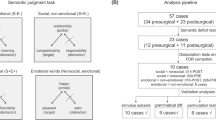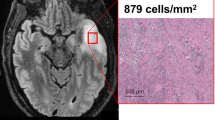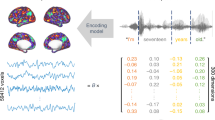Abstract
THE analysis of neuropsychological disorders of lexical processing has provided important clues about the general organization of the lexical system and the internal structure of the processing components1–3. Reports of patients with selective dysfunction of specific semantic categories such as abstract versus concrete words4–6, living things versus inanimate objects7–11, animals12–14, fruits and vegetables15, proper names16,17 and so forth, support the hypothesis that the neural organization of the semantic processing component is organized in these categories. There are reports of selective dysfunction of the grammatical categories noun and verb18–21, suggesting that a dimension of lexical organization is the grammatical class of words. But the results reported in these studies have not provided unambiguous evidence concerning two fundamental questions about the nature and the locus of this organization within the lexical system. Is the noun–verb distinction represented in the semantic or in the phonological and orthographic lexicons? Is grammatical-class knowledge represented independently of lexical forms or is it represented separately and redundantly within each modality-specific lexicon? Here we report the performance of two brain-damaged subjects with modality-specific deficits restricted principally (H.W.) or virtually only (S.J.D) to verbs in oral and written production, respectively. The contrasting performance suggests that grammatical-class distinctions are redundantly represented in the phonological and orthographic output lexical components.
This is a preview of subscription content, access via your institution
Access options
Subscribe to this journal
Receive 51 print issues and online access
$199.00 per year
only $3.90 per issue
Buy this article
- Purchase on Springer Link
- Instant access to full article PDF
Prices may be subject to local taxes which are calculated during checkout
Similar content being viewed by others
References
Caramazza, A. A. Rev. Neurosci. 11, 395–421 (1988).
Shallice, T. From Neuropsychology to Mental Structure (Cambridge University Press, 1988).
Ellis, A. & Young, A. Human Cognitive Neuropsychology (Lawrence Erlbaum, 1988).
Warrington, E. K. Q. J. exp. Psych. 27, 635–657 (1975).
Warrington, E. K. Phil. Trans. R. Soc. B295, 411–423 (1981).
Warrington, E. K. & Shallice, T. Brain 107, 829–853 (1984).
Warrington, E. K. & McCarthy, R. A. Brain 106, 859–878 (1983).
Warrington, E. K. & McCarthy, R. A. Brain 110, 1273–1296 (1987).
McCarthy, R. A. & Warrington, E. K. Nature 334, 428–430 (1989).
Basso, A., Capitani, E. & Laiacona, M. J. Neurol. Neurosurg. Psychiat. 51, 1201–1207 (1988).
Goodglass, H. & Budin, C. Neuropsychologia 26, 67–78 (1988).
Sartori, G. & Job, R. Cognitive Neuropsych. 5, 105–132 (1988).
Silveri, M. C. & Gainotti, G. Cognitive Neuropsych. 5, 677–709 (1988).
Hillis, A. & Caramazza, A. Brain (in the press).
Hart, J., Berndt, R. & Caramazza, A. Nature 316, 338 (1985).
Semenza, C. & Zettin, M. Nature 342, 678–679 (1989).
McKenna, P. & Warrington, E. K. J. Neurol. Neurosurg. Psychiat. 41, 571–573 (1978).
Miceli, G., Silveri, M. C., Villa, G. & Caramazza, A. Cortex 20, 217–220 (1984).
Baxter, D. & Warrington, E. K. Neuropsychologia 23, 653–666 (1985).
McCarthy, R. A. & Warrington, E. K. Neuropsychologia 23, 709–723 (1985).
Zingeser, L. B. & Berndt, R. S. Cognitive Neuropsych. 5, 473–516 (1988).
Dunn, L. M. & Dunn, L. M. Peabody Picture Vocabulary Test-Revised (American Guidance Service, 1981).
Goodglass, H., Kaplan, E. & Weintraub, S. The Revised Boston Naming Test (Lea & Febiger, 1983).
Caramazza, A. & Hillis, A. Cortex 26, 95–122 (1990).
Badecker, W. & Caramazza, A. Cognitive Neuropsych. (in the press).
Coltheart, M., Patterson, K. E., & Marshall, J. C. Deep Dyslexia (Routledge, 1980).
Allport, D. A. & Funnell, E. Phil. Trans. R. Soc. B295, 397–410 (1981).
Patterson, K. E. Q. J. exp. Psych. 30, 587–601 (1978).
McClelland, J. L., Rumelhart, D. M. & Hinton, G. E. in Parallel Distributed Processing: Explorations in the Microstructure of Cognition Vol. 1 (eds McClelland J. J. & Rumelhart D. E.) 3–44 (MIT, 1986).
Author information
Authors and Affiliations
Rights and permissions
About this article
Cite this article
Caramazza, A., Hillis, A. Lexical organization of nouns and verbs in the brain. Nature 349, 788–790 (1991). https://doi.org/10.1038/349788a0
Received:
Accepted:
Issue Date:
DOI: https://doi.org/10.1038/349788a0
This article is cited by
-
Action fluency identifies different sex, age, global cognition, executive function and brain activation profile in non-demented patients with Parkinson’s disease
Journal of Neurology (2021)
-
The verb and noun test for peri-operative testing (VAN-POP): standardized language tests for navigated transcranial magnetic stimulation and direct electrical stimulation
Acta Neurochirurgica (2020)
-
Levels of Abstractness in Semantic Noun and Verb Processing: The Role of Sensory-Perceptual and Sensory-Motor Information
Journal of Psycholinguistic Research (2019)
-
The Picture–Word Interference Paradigm: Grammatical Class Effects in Lexical Production
Journal of Psycholinguistic Research (2016)
-
The Effects of Verb Argument Complexity on Verb Production in Persons with Aphasia: Evidence from a Subject–Object–Verb Language
Journal of Psycholinguistic Research (2016)
Comments
By submitting a comment you agree to abide by our Terms and Community Guidelines. If you find something abusive or that does not comply with our terms or guidelines please flag it as inappropriate.



